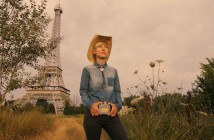
The Turin Horse (2011)
Cast: János Derzsi, Erika Bók, Mihály Kormos
Director: Béla Tarr
Country: Hungary | France | Germany | Switzerland | USA
Genre: Drama
Editor’s Notes: The following review is part of Next Projection Presents Apocalyptic Poetry: The Films of Bela Tarr. Please look out for more of our original series throughout 2015.
Oppressive wind torments the lonely inhabitants of a desolate landscape. It sweeps across the lifeless, chalky soil with brutal relentlessness, tearing down the landscape one layer at a time. If there is a deity minding the shop it seems to have either lost interest in the plight of humanity or is actively working at its destruction, but in either case the experiment has failed and there is no redemption for our sordid lot. Those present to witness the death of the world press on, driven by outmoded survival instincts as they bring in the water and eat their daily potato as they have done for as long as they can remember. Joy died long before the light of the world finally flickered out, and the damned sit and watch the slow erosion of the earth, devoid of the burdens of hope and inquisitiveness as they somberly await the final reprieve of death.
Bela Tarr begins his final film with an anecdote about the final days of Nietzsche and his descent into madness after coming to the aid of a horse being brutally beaten by its owner.

Bela Tarr begins his final film with an anecdote about the final days of Nietzsche and his descent into madness after coming to the aid of a horse being brutally beaten by its owner. The anecdote is ultimately meaningless, punctuated by a punch line conjured by Tarr when he had first heard the story and inquired about the fate of the horse. The anecdote is everything and nothing, colored by details that suggest a grand significance that isn’t really there and wryly humorous by way of intellectual deadpan that is easily overlooked by those afraid to trust their own instincts. The anecdote is as cosmologically insignificant as the fate of humanity, secretly convinced of its own permanence despite its infinitesimally short existence relative to the cosmos. The fate of the horse is as important as the fate of humankind precisely because they are both unimportant if one believes as Tarr believes that our existence is not only finite but past its apex.
These are not characters that watch the passing of the world with secret wistfulness and unspoken ambitions like the characters in Tarr’s earlier films.
Like the brutal winds that stand in for God in The Turin Horse, Tarr has been stripping away the layers of his cinematic approach as he matures from the unfettered idealism of youth to the hard earned pessimism of old age. His early films were concerned with social injustice as the young idealist set out to change the world, but as each passing year revealed injustice thriving with an inexhaustible supply of fresh disguises, Tarr found that the problems of humanity weren’t quite as simple as he had originally believed. It’s a lesson that can only come with age and experience as one needs to be intimately acquainted with injustice and its knack for prestidigitation to recognize when it surfaces in its new forms. Once you recognize that the problems of the world are more difficult than you had originally believed, you can free yourself from the burdens of saving humanity and find peace in our cosmic insignificance.
In this basest concentration of Tarr’s cinematic mastery, we find truth and beauty amidst its contrasts and contradictions. Tarr’s signature long takes allow us to explore the painterly frames as the aesthetic beauty of the weathered and mundane wields its contradictory powers. We savor each broken wall, find intrigue in hollow faces obfuscated by shadows and silent longing, and mourn for the soulless eyes of characters that must choose each movement carefully as to not waste precious energy as resources are dwindling and the light of the world is slowly dying. These are not characters that watch the passing of the world with secret wistfulness and unspoken ambitions like the characters in Tarr’s earlier films. They instead wait in silence for the end of the world to arrive so they may casually flicker out of existence; unmourned, uncelebrated, and abandoned by a God that has either died or long forgotten about its insignificant creations.
Like the brutal winds that stand in for God in The Turin Horse, Tarr has been stripping away the layers of his cinematic approach as he matures from the unfettered idealism of youth to the hard earned pessimism of old age.



